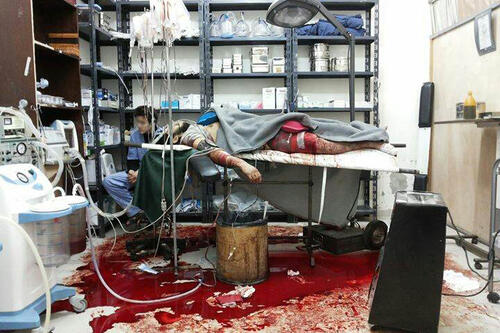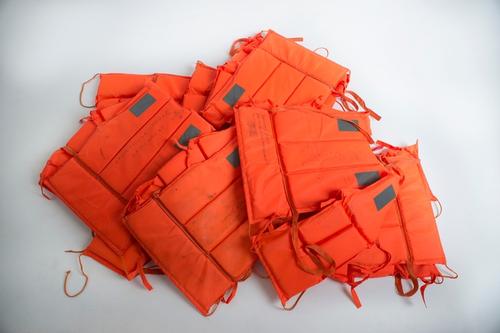Dr. S is a young surgeon who graduated shortly after the outbreak of the crisis in Syria. He now works in a makeshift hospital in a semi-rural neighbourhood located to the east of Damascus. This is a facility that received dedicated MSF support and supplies throughout the period of siege, support that continues on a regular monthly basis to this day. He tells the story of his medical journey - an experience that parallels the war in the country.
A temporary truce that death could not penetrate
There was a pregnant woman who was trapped during the time we were under full siege. She was due to deliver soon. All negotiation attempts to get her out failed. She needed a cesarean operation, but there was no maternity hospital we could get her to, and I had never done this operation before.
A few days before the expected delivery date, I was trying to get a working internet connection to read up information on doing a C-section. The clock was ticking and my fear and stress started to peak. I wished I could stop time, but the woman’s labour started. The atmosphere was tense already, with mad shelling hammering the area. The bombardments had reached a deafening level. We brought the woman into the operating theatre and I did the operation. Joy overwhelmed me when we knew the baby girl was healthy, and her mother too.
In this madness, our work as surgeons is to save as many lives as we can. Sometimes we succeed, and sometimes we fail. It is as if we repair the damage that the war left. But this operation was not the usual damage repair; it helped bring new life to this earth. It was a magical moment; a temporary truce that death could not penetrate.
I chose a deserted school as my hospital
I graduated as a surgeon shortly after the crisis started in Syria. In the Summer of 2011, with the acceleration of events and medical needs increasing, I started working in small private hospitals. A few months later, I was arrested, as were many of my colleagues. At the beginning of 2012 I was out, and I returned to treat people and carry on my general surgery specialization. I was working in improvised field hospitals, operating in conditions that were largely unsuitable for medical work. We worked in the east of Damascus and then in the Ghouta area, where the medical need was urgent.
At the end of 2012, a semi-rural neighbourhood located to the east of Damascus witnessed violent clashes. The area was packed with displaced people at the time, without any medical centre to treat wounded people. I went there and decided to set up a field hospital. Following a search, I chose a deserted school that had previously been hit. The upper floors were damaged, but the ground floor, as well as the basement, were in a good shape. Despite the daily, continuous shelling on the area, and the constant fear and stress, the medical team with which I worked managed to provide tremendous medical care to those who needed it the most.
The siege
One day in July 2013, around 10:00 am, the hospital was hit by a rocket. The massive explosion turned the place upside down and its pressure tore out the wooden walls. Medical tools and people were thrown in all directions. Soon a dust cloud settled over the building and made it impossible to see. The explosion was like nothing before. I thought that worse could follow and this explosion might be only the beginning of something very bad. Indeed, shells rained on the area and we could hear the clashes getting worse.
As we were getting over the shock, one of the hospital workers collapsed. She lived near the hospital. Her young boy was at home and the area was coming under heavy shelling. She could not keep it together and she wanted to save her child. A medic offered to go out and look for the child. I did not like the idea because we did not know what was going on outside. As soon as the medic was out of the hospital door, he saw a tank with its gun facing towards him. A healthy man walked out, and few moments later, he came back with shards of metal in his body. It was only then that we realized the severity of the situation outside. We decided to evacuate the hospital - two medics per patient to carry them - and we got out of the back door.
It was apocalyptic! We tried to walk fast towards a small medical centre not far from there. Shelling was hammering the fields around us. I was expecting the worst with every shell we heard. We managed to arrive at our destination unharmed. It was like a miracle. We had left our equipment in the evacuated hospital, but we did not dare to go back there. Over the next days, we heard that the fighting was moving away from the area around the hospital. Under heavy bombardment, we decided to go back and bring our equipment. We had to do that to be able to treat people. Taking turns to do the trip, we managed to retrieve as much as possible after ten days.
From then, we were under siege – impossible to get in and out of there. This was also true for medical supplies. We received a flow of injured people since the first day of the siege. I often operated on two people at once. We worked around the clock. Sleeping and resting were an impossible luxury. We managed to stop for few moments before dawn to eat some food and drink some water, before getting back to work. Most days heavy shelling and raging fighting brought us more injured people, leaving us no chance to rest. The numbers of injured people were way beyond what we could handle, and that forced us to make painful clinical decisions.
We were under siege for eight months, up until February 2014. Eight months of suffering and stress, followed by a ceasefire, during which many people managed to go back to their homes. It became easier to get hold of supplies, and that helped us to continue providing medical care to people in need. Nevertheless, the humanitarian situation remained bad. There were still often clashes at the edges of the this area and the shelling was still frequent. This formal ceasefire did not change the nature of our work, but we finally found enough time to expand the hospital. People returning to the neighbourhood meant an increase in the needs, thus more pressure on us. We setup an obstetrics department and clinics to provide basic medical care and chronic diseases management. We could start doing bone, internal and urinary surgeries; all operations we could not perform before because we had suffered critical shortages of supplies and we had been prioritizing life-saving operations.
MSF continued to provide us with much of what we needed. We even received laboratory kit, which allowed us to carry out diagnostic tests. And we received an incubator for the obstetrics unit. Little by little, we could start to respond to all the basic general medical needs for the people in the area.
It has to stop, one day
Three years of non-stop surgery under tough circumstances - I have maxed out. I’ve had enough of scenes of misery. I was on the phone recently with my surgery professor and he said: “regardless of the operating conditions, your work during these three years matches my whole 30 years’ experience as a doctor. You have reached retirement in just three years.” And indeed, every moment of every day I feel I have had enough, but we have no other choice. People here need us. They are in desperate need of all kinds of medical care, from the most simple to the most complicated. We cannot add another reason for the deterioration of this already disastrous situation.
Today, I am almost certain that, when the war is over, I will quit medicine. Any human being would make that decision after living what I have lived through. I look forward to the end of this war. It has to stop, one day. Then, I can choose what to do. Only then, will we be truly alive again.
Although Médecins Sans Frontières (MSF)/Doctors Without Borders is currently able to run six health facilities in the north of Syria, in most of the country the organization cannot have teams working directly on the ground providing hands-on medical care. But in order to ensure some continuity of medical provision in the midst of this war, MSF supports over 100 medical centers across Syria where medical help is needed the most, with a focus on besieged communities and active conflict areas where there is little or no other medical support being provided.





